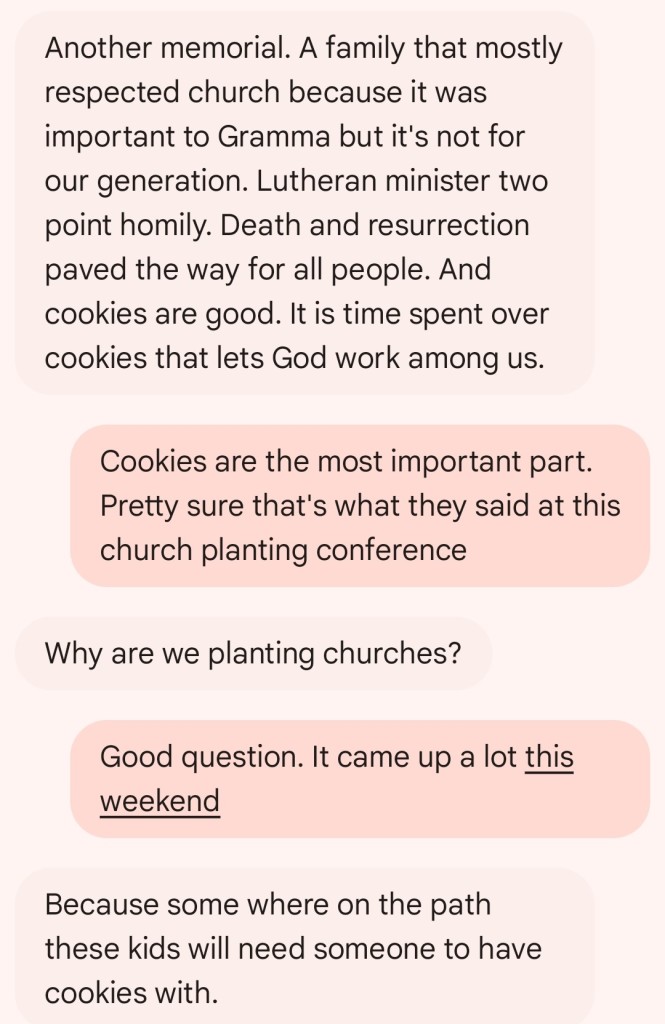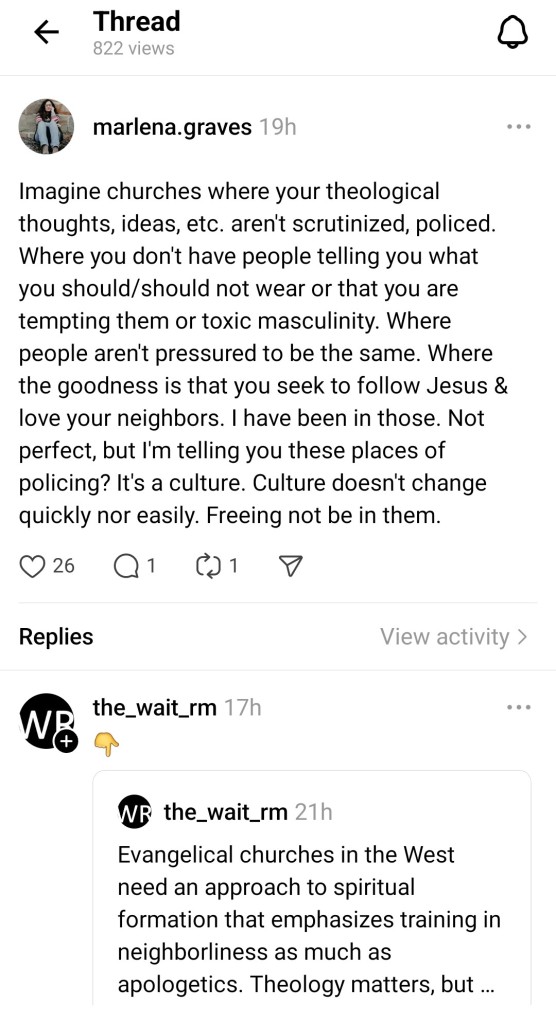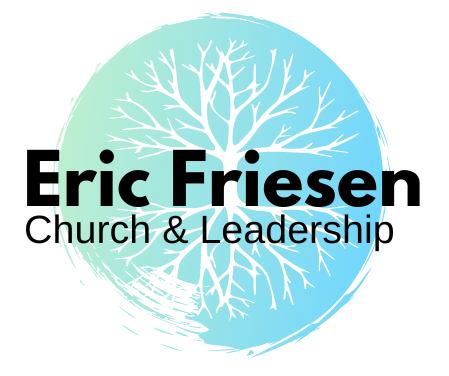Before reading further you may want to take a glance at an old post I wrote about doing church in the world. It is based in reading Tim Soeren‘s book, Everywhere You Look. Here’s the link to the post: What is the church for?
So, let’s talk a little more about church as a 3rd place.
I like to use the tricky word ‘gospel’ here, because it says something about what we see as church in our world. At its core, gospel is ‘good news’. Very simple. A very simplified historical image for the word is the action of proclaiming, if it helps, think of a messenger running back to the city during war, yelling the news to everyone along the way to the monarch. It gives a sense of urgency and clarity to the situation at hand. Christian nomenclature often has the word used as a noun, not just a verb, where it is a named property. You might see it in a heading in your Bible, at the beginning of the New Testament, the first 4 books being the witness accounts to Jesus while on Earth. “The Gospel of John” is an example of this. And throughout the New Testament, gospel becomes a thing that is shared, not just the sharing. That is where a word like ‘witness’ comes into play, which paired with ‘evangelism’, is the proclamation of what has been seen or experienced.

‘Witness’ in the original language of the New Testament is the same word we get ‘martyr’ from today. So as you might imagine, it carried some weight in meaning, especially when associated with the word ‘gospel’. Witnessing to the good news…
So what is your church’s ‘good news’?
For many churches trying to be a 3rd place, they have opted to not discuss anything controversial amongst their members. And so doing, they make the gospel and discussion of faith an external topic. Something that does not apply directly to life and how it is lived. You have a temple existence, and you have a secular existence.
In this extreme, church and faith are a private matter.
Others, completely immersed in the attractional view of church in place, strive to be the only third place in the community, OR in the midst of many communities. Everything then becomes church, otherwise you go home or you go to work. For some the workplace becomes a place for evangelism, to get those people to come to your third place. Everything becomes about this place being your everything. That is not really a third place, rather a form of first or second.
In this extreme, the world is always opposing church and faith, and church acts like a 3rd place, but resembles your 1st.
Those are 2 extremes, and you might find your church landing close to both, or maybe right in the middle. It might depend on the season and who is most involved at the moment. The good news in either extreme is related to what the gathered community exemplifies as important. Did you catch that? My definition here is not the good news according to you, but to those who see it and hear it around you. Most of us who get too comfortable with the language ‘at home’, the idioms, the slang, the inner-speak that marks being a part of your community, easily lose sight of the definition we hope to convey.
This is why I ask churches to know what they mean, then say it with clarity. Otherwise, the words just lose meaning.

When the New Testament writers were conveying this newness of faith, it was very much a set of inhouse documents. These were letters of faith to a faith community who were unsure of what it all meant, and what it would mean going forward. Within this witness to one another the reality was made clear, they were a witness to those around them. Their faith was evidential based on their experience with the news, from the inside of the group, to the outside by way of doing life. And for many, the urgency was in Jesus’ promised return, viewing it as happening in their lifetime, which is why some of the passages to the young churches reflect the idea of doing everything possible to be ready. No marriage, singleness, tell people now, prepare the way. Be ready, because the good news is NOW.
We are far removed from that era, which means how we do community has changed, and matters of urgency reflect that. A very clear example would be meeting space: First century Christians met where they could, went through a simple liturgy of faith, then lived it into their various ways of life. Today we build places called churches, and establish social patterns within them. Another example: First century Christians were considered a threat to both Judaism and the Roman empire, but by the fourth century Christianity became the state religion, and thus we enter Christendom. Today we have to discuss the threat of Christian Nationalism and declining attendance numbers in gathering places. In a Post-Christendom context we have the institution of faith, a religious entity, and what it represents in a secular age. Once again asking the question: What is the church for?
Earlier I said the church needs to know what it means, and say it with clarity. That is definitely not a call to more dogmatics, more exclusive activity, or asking ourselves what everyone else thinks of us. It is a call to reflection on what our good news is to us, then to those who see us and hear us.
I am an advocate of the 3rd place.

I really am. I am an advocate for Christ-followers creating depth in love and spirit. I do not think they are mutually exclusive, but I also know first hand navigating them together is difficult to the point of mystery. For many, the common space is within their building, which asks the question: Is it really a common space? For others, the common space is the community space, which asks the question: Where is the space of faith dialogue? One has entry requirements within its walls, the other tries to find a centre for dialogue in a mutual space. As I described in my prior post on the church as a 3rd place, the vast majority of institutional churches in Post-Christendom want to be considered that space, on their grounds, using an attractional model of bringing everyone into a church service, but will struggle with accommodating a dialogical framework that brings others into the conversation.
As Dr. Stefan Paas described in his public lecture, as part of the ‘Rhythms & Rituals’ conference (I talk about it in this post: Pause), the church in the Secular age becomes a gathering of priests. Interceding on behalf of, speaking into the faith conversations of the community, caring for those in need. Representing and attesting to God’s shalom in this world.
What each church does with that is up to them. Faithful presence means something different to each group, from being faithful to who meets on Sunday, to being faithful while doing life in the neighbourhood. Not all are clear on whether they are comfortable with being who they are, in a world that may have a better answer for them than they do.
So what is your gospel? Who’s good news is it?
